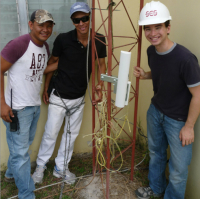
 Changing the world is hard.
Changing the world is hard.
Changing the world while balancing social, professional, family, and financial needs is even harder. So how can you make the change you want to see in the world without reaching that exhaustion point where you wish that someone would come and change your own burnt-out world? Rather than nixing the idea of helping the greater good, I recommend combining your needs into one.
I balance my need to change the world by doing it professionally. I run a website development company called Twomile whose mission is to create Web sites that produce positive social change. And as you might expect, running a business in this market is difficult because organizations often have lots of passion but unfortunately not much money. I want to share two different examples of how Twomile helped support great causes without funds while our company still benefited.
1) Pro Bono Work
A Honduran nongovernmental organization called Olancho Aid was in a unique situation where they had many poor children who could benefit from a quality education, and they also had a strong network of donors from the United States. Olancho Aid came to us in 2010 needing a tool that could connect the donors to the kids before the new school year started…which was only a month away. This program had no money to start, but the people running it were thankfully a band of highly organized and empowered volunteers.
Twomile was in a situation where we could either reject this work until they got enough money (which they weren’t going to get in the next month) or do this project pro bono and help send more than 20 children to school the very next month. We decided to take it on pro bono and built out a basic platform for them in just eight hours. This year, the Scholarship Platform now has 53 children up for sponsorship. It’s amazing how eight hours can change so many lives! This project paid off not only through the amazing amount of self-fulfillment we got, but also through the networking opportunities with other NGOs in Honduras also needing technological aid.
2) Incubation
In 2009, my local rose garden had a fabulous idea of tracking volunteer hours to motivate more people in the community to contribute. Creating a tracking system for around 30 volunteers a month unfortunately was a bit out of everybody’s budget. My company decided that this idea was something many organizations could use and that we would instead create a platform from which hundreds of organizations could all benefit. Given that we had technology and business resources, we incubated a product called OurVolts and shouldered all the expense of development with the hope of recouping the costs once people started subscribing. Look at how many hours people volunteer at the San Jose Rose Garden!
My company is proud and excited about this opportunity that was only possible because a group of gardeners had a “crazy idea” and definitely did not have the budget for it at all. I’ve seen other companies offer sliding scale rates for nonprofits, accept a barter of fresh honey from a bee association for a new Web site, or train new developers on sites that just needed to get done. By no means am I trying to imply that this is easy at all–the business decisions around offering pro bono work or to incubate a project are huge–but I am implying that opportunities to change the world are abound. If you look in your social life, your professional life, or your family life, with a little effort, you will find ways to also make a difference while maintaining a fulfilling balance in your life. Give that friend a small compliment, recycle that paper in your office, inspire your child with super hero stories. I am a firm believer in doing that small thing for the sake of the greater good. It will cause a positive ripple in our society that points right back to you. At that rate, you could be doing social good way more than 40 hours a week!
James McBryan is a partner at Twomile and is the the Pro Bono Role Model of the Year for the Taproot Foundation.

